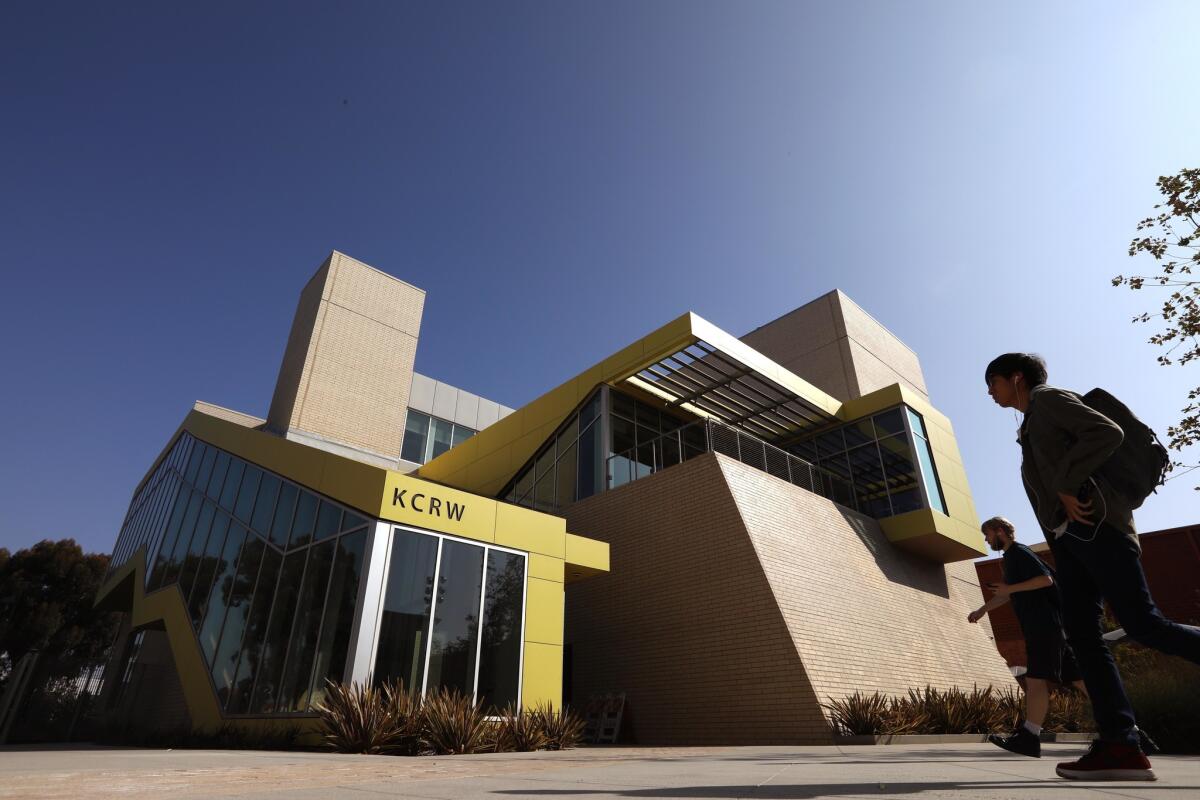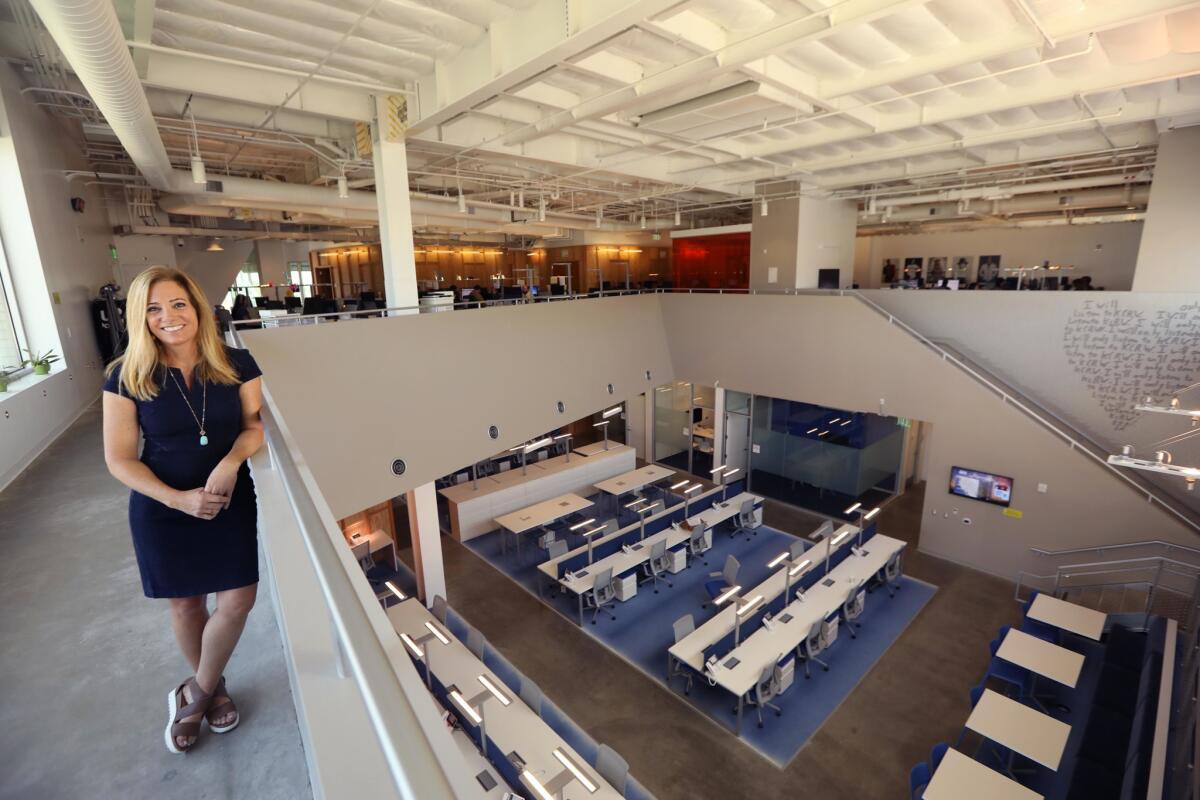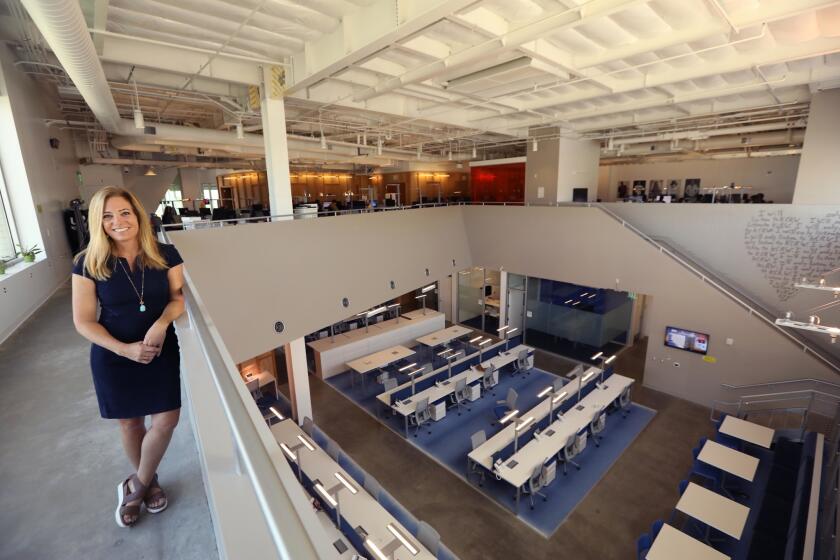Uproar at KCRW as former producer accuses public radio giant of ‘blatant racism’

- Share via
The Santa Monica-based public radio station KCRW-FM (89.9) is under fire this week after a former news producer alleged that she experienced a pattern of racist behavior while working there.
Cerise Castle said in a podcast interview and on social media Monday that her time at KCRW was “marked by microaggressions, gaslighting, and blatant racism starting when I was physically prevented from entering the building multiple times within my first month of employment.”
For the record:
12:34 p.m. Feb. 26, 2021A previous version of this story quoted from a letter written by Cerise Castle in which she says she witnessed a KCRW staff member saying that “structural racism isn’t real.” A tweet on Wednesday from Castle clarified that she “conflated two meetings that happened over a year ago.” A former employee of KCRW who had reportedly relayed the remark to Castle explained on Twitter that “I did tell Cerise that I felt that my editor treated [a] story like structural racism doesn’t exist.” We have removed Castle’s allegation from the story.
She originally outlined her experiences in a farewell letter to staff last year after accepting a buyout, along with two dozen other station employees. On both the podcast, called “LA Podcast,” and Twitter, Castle, who worked at KCRW for a little more than a year and before that was a producer for Vice, decried the station’s lack of racial representation and accused management of appropriating her ideas.
KCRW has offered buyouts to staff members, and more than 20 of them — including DJs Liza Richardson, Mario Cotto and Mathieu Schreyer — have accepted.
“I’ve had employees tell me that my hair was ‘militaristic’ and that I remind them of a ‘gangsta,’” she wrote in the letter. “I have been screamed at in front of my intern and direct manager and nothing was done. When voicing my thoughts on segments and programming, I’ve been told that I am ‘loud’ and ‘angry.’”
Last week, Castle alleged on Twitter that the station had claimed credit for an idea she had while she was employed there, for a newly announced content initiative called #MyBlackLA. In response to a tweet promoting the project by KCRW’s then-director of digital content, Drew Tewksbury, she said, “To me, this is a prime example of a media outlet using ideas originally pitched by Black employees after a mass exodus of Black workers.”
Castle also noted that one of the two staffers that Tewksbury had tagged in the tweet had “no idea why he was thanked for this. He did not work on the project.” Tewksbury resigned his position Monday. (Tewksbury, who declined to comment, served as interim books editor at The Times in 2019.)
Now a freelance reporter, Castle, 27, stressed the lack of diversity among the ranks at KCRW. “They’ve got Black ideas, and they’re making them without any Black people,” she said on “LA Podcast.”
On Wednesday, Jerome Campbell, a Black producer at KCRW who also took the 2020 buyout, backed Castle’s assertions in a Twitter thread. “I wanna start out by saying believe @cerisecastle. Without hesitation,” he wrote before describing specific frustrating experiences he had at the station.
Campbell identified one moment in particular, when a white producer doubted the veracity of a Black source’s account, as “the reminder of many conversations throughout my career with superiors or more senior staff members in the workplace who have leveraged my racial identity for the benefit of the institution at the expense of my voice.”
Campbell worked as a writer for The Times from 2014 to 2018.
In a statement Tuesday, KCRW disputed some of Castle’s assertions and noted that it was not approached for comment by “LA Podcast” before the episode was released on Monday. The station added that, in the wake of allegations outlined in Castle’s farewell letter, last year it “took steps to address them and conducted a 4-month investigation” with an external law firm.
“Ultimately,” the statement continued, “several of the claims were found to be unsubstantiated or not corroborated. But we take all claims very seriously.”
Castle declined to comment for this article.

In a follow-up email to employees on Tuesday, KCRW President Jennifer Ferro acknowledged Castle’s accusations and said that “[t]hose comments and others caused us all to examine our assumptions, our work, our prejudices and the reality that was exposed.” She added, “I believe we neglected to communicate compassion to Cerise and others who had unhappy and unwelcoming experiences at KCRW which caused them to leave. For that, on behalf of KCRW, I am incredibly sorry.”
Ferro declined to comment further for this article.
One of two National Public Radio affiliates in the Los Angeles market competing for an often-overlapping audience, KCRW, owned by Santa Monica College, has long been a tastemaker both in L.A. and in public radio circles. Its best-known music show, “Morning Becomes Eclectic,” has helped break artists including Adele, Coldplay and Beck.
Unlike most NPR affiliates, KCRW mixes music and talk, with free-form music programming that the station has long billed as “handpicked.” Last year, its DJs joined with other content creators in KCRW’s newsroom to successfully unionize as WeMakeKCRW.
Management’s response to Castle’s charges wasn’t well received by WeMakeKCRW, which said: “That statement does not speak for us at WeMakeKCRW, the station’s content staff represented by SAG-AFTRA. We find KCRW leadership’s response to be totally inappropriate and a shirking of responsibilities. We demand better from our leadership and ourselves as an organization.”
The controversy at KCRW is the latest in a series of media reckonings over race and representation that have transpired following the police killing of George Floyd in May 2020. In September, Times owner Dr. Patrick Soon-Shiong acknowledged the newspaper’s history of racist behavior in an open letter, writing, “The Times has also mirrored, and in some cases propagated, the biases and prejudices of the world it covers, reflecting and shaping attitudes that have contributed to social and economic inequity.”
In an interview late last year, Ferro acknowledged KCRW’s challenges: “We should absolutely reflect the diversity of Southern California, and I do not think we’re at that place.” She called equity “a 100% goal for us.”
“Diversity was a big issue,” said one former content producer who worked at the station for nearly a decade. The staffer, who is white, requested anonymity to speak freely. Describing the workforce as “not really reflective of the demographics of the community,” the producer noted that there were “almost no Black employees there, no Indigenous, a few Latinx employees [and] some Asian employees, but not many.”
In an email to The Times, Ferro disputed those claims, writing, “The current make-up of KCRW’s staff is 65% white and 35% people of color, and the station is implementing strategies to reach out to diverse candidates for all open positions.”
Novena Carmel and Anthony Valadez will take over the morning show for interim host Anne Litt. They are the show’s first Black and Latino hosts.
Tyler Boudreaux was one of those few Black staffers who took the 2020 buyout. She began volunteering at KCRW four years ago before becoming outreach coordinator for the station.
“[KCRW] doesn’t reflect Los Angeles,” she told The Times. “There needs to be more Black creatives and more Black producers in higher management roles at KCRW.”
After listening to Castle’s appearance on LA Podcast, Boudreaux said she remembered when Castle reached out to her on one of the days she was stopped upon entry at KCRW’s brand-new $38-million headquarters and studios. “You hear her pain, those are traumatic experiences,” Boudreaux said of Castle. “It made me sad to hear. And I believe her. I think just hearing it makes you realize that there’s a lot more work to do, in a lot of spaces that are majority white people.”
Another current staffer, who also requested anonymity to speak freely, said the station’s leadership is a core reason for the strife. “Is KCRW a racist organization? No, not by any means,” the staffer said. “Are there people there who make offhand comments that they don’t know are racist in undertones? Yes.”
“We are doing what we believe we must do,” Ferro wrote in her email to staff. “Create a comprehensive plan to create a diverse and inclusive workplace. We are taking the steps and doing the work to make this organization better.” Included in the note was what she called “a recent report on the work we have embarked on. We know this work will never be complete but we will always aspire to be better.”
Called “A Pledge for Equity,” the four-page document is dated March 1, 2021, and lists two overarching goals: “Build a diverse workforce and audience that reflects the racial, ethnic, LGBTQIA and gender make-up of Los Angeles”; and “Foster an anti-racist culture within KCRW.”
Jarrett Hill, a fill-in host at KCRW and incoming president of the Los Angeles chapter of the National Assn. of Black Journalists, said his experience overall at the station has been “relatively positive, but peppered with different moments where I’ve definitely felt, ‘This is a race issue here.’” He said Castle’s case shows how much further it needs to go.
Hill has been engaged in conversations with KCRW leadership for months and as recently as Wednesday in his role with NABJ-LA to push it to improve.
“I’ve worked with the people in the newsroom and they’re fantastic people. They do great work,” Hill said on Wednesday. “But when the newsroom is as white as it is, in a city as diverse as Los Angeles, that’s a huge problem.
“They’re committed to changing their workplace, and that commitment does sound genuine, but it’s a slow process,” he added.
More to Read
The biggest entertainment stories
Get our big stories about Hollywood, film, television, music, arts, culture and more right in your inbox as soon as they publish.
You may occasionally receive promotional content from the Los Angeles Times.













